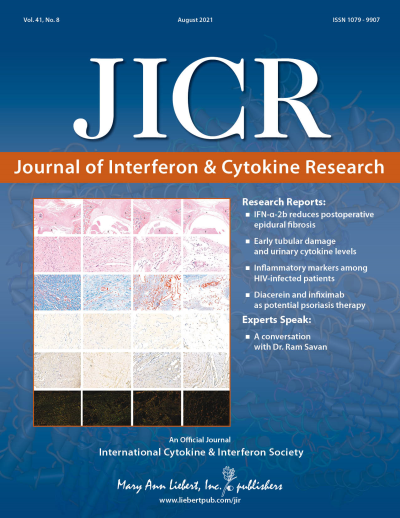Basic and Clinical Aspects of Cytokine Storms in Infectious Diseases
Guest Editors:
Joaquín Zúñiga
Laboratory of Immunobiology and Genetics,
Instituto Nacional de Enfermedades Respiratoria Ismael Cosío Villegas
Mexico City, Mexico
Jose Alberto Choreño-Parra
Laboratory of Immunobiology and Genetics,
Instituto Nacional de Enfermedades Respiratoria Ismael Cosío Villegas
Mexico City, Mexico
Cytokine storms are characterized by the excessive release of pro-inflammatory soluble mediators (hypercytokinemia) resulting from an overdriven immune response to noxious insults, including infectious agents. Indeed, the idea that severe infectious diseases are caused by the host's out-of-control immune response rather than the pathological effects of the causative microorganism has prevailed for years as a paradigm for studying many viruses like influenza and Ebola, as well as sepsis-associated bacteria.
This conception of an exuberant immune reaction as the driving force of critical illness has gained additional interest since the identification of acute respiratory distress syndrome associated with SARS-CoV-2 infection. As such, several investigations have identified that the sudden release of cytokines can cause extensive lung damage, respiratory and multisystem organ failure, and death in patients with COVID-19. The dysregulated inflammation may also be the basis of subsequent sequela observed in many convalescent COVID-19 patients, including lung fibrosis and a dramatic decline of pulmonary function that limits the quality of life. Strikingly, immunosuppressant therapeutics used to treat sepsis and septic shock, along with novel monoclonal antibodies aimed at calming hyperinflammation, are being administered to critically ill COVID-19 patients with promising outcomes, reinforcing the concept of cytokine storms.
With this in mind, the focus of this special issue is to highlight this recent progress in understanding the basic biology and therapeutic control of hypercytokinemia in the context of different types of infection. Original studies, systematic reviews, narrative reviews, commentaries, and case reports on the following topics will be considered for peer review and publication:
- The genetic bases that determine risk for cytokine storm and severe illness during infection
- The underlying biochemical and immunological mechanisms that drive hypercytokinemia
- Analysis of the immunological characteristics of patients with infection-associated cytokine storm syndromes
- Comparisons of the immune signatures and cytokine production patterns of patients with COVID-19, seasonal influenza, and pandemic influenza A(H1N1)
- The diagnostic and prognostic value of hypercytokinemia during infection
- Impact of vaccination on the course of hypercytokinemia
- Impact of co-existing autoimmune diseases on the course of cytokine storms during infection
- Impact of co-existing infections on the course of hypercytokinemia during COVID-19
- Cytokine storm against infection in the context of metabolic comorbidities
- Impact of hypercytokinemia on multiorgan function during infection
- Animal models for studying hypercytokinemia
- The effectiveness of therapeutic agents aimed at calming hyperinflammation during infection
- Case reports offering novel diagnostic and therapeutic perspectives of hypercytokinemia
Visit Journal of Interferon & Cytokine Research to learn more and view Author Submission Guidelines.
Editorial Questions?
Please Contact: Karen Cloud-Hansen
